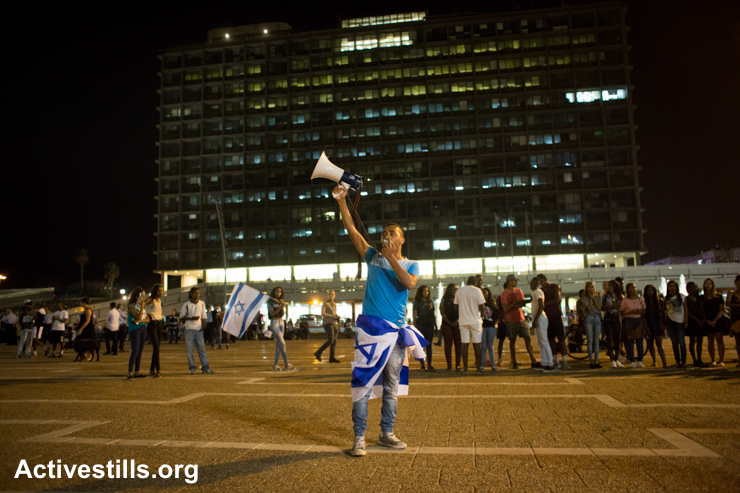Whatever hopes and faith the community had in the state have been shattered in recent years by rampant racism and police brutality.
By Avi Yalou

The story of the late Yosef Salamsa, like the video of Israeli police beating IDF soldier Damas Pakada — which prompted tens of thousands from the Ethiopian community in Israel to fill the streets of Jerusalem and Tel Aviv — was the spark that sparked the fire (Salamsa was tasered by police, left outside the police station, and later committed suicide). The heated demonstrations and unification of the Ethiopian community – people from all walks of life, ages and socioeconomic status — to demand an end to police brutality are an expression of the deep-rooted racism that exists in Israel and goes well beyond these specific incidents. Those who refused to heed the call for an end to the systematic racism against Ethiopians may have been surprised by the intensity of the protests in May of last year. But the truth is that in light of the long series of racist incidents that accrued over the years, it was obvious that if change did not happen, the issue would boil over.
The Ethiopian community numbers only 1.7 percent of the population in Israel, according to the Central Bureau of Statistics. This is a small population that has been consistently marginalized in Israeli society. The community screams and no one listens. The State of Israel, in all its various authorities — the government, Knesset, legal system, media, private and public sector – sees Ethiopian citizens as a marginal unimportant community, who at best should be grateful to the state.
Members of the Ethiopian community live an unlivable reality. On the one hand, their electoral political and economic power barely exists. On the other hand, the regime’s forces abuse it, exclude it and violate its members in sophisticated ways that are a clear product of the racist, classist perspective that sees the Ethiopians as a spatial threat to white Israel. Whatever hopes and faith the community had in state institutions in the past have eroded and been pulverized in recent years. What hasn’t yet been destroyed by the state’s failing immigration and absorption policy has been destroyed by the ministries of education, health, religion and police, which have excluded, labeled and trampled all over the community. As if that wasn’t enough, the media has joined the campaign, depicting the community as violent, barbaric, parasitic, ungrateful, damaging to property and to the public order.
Today it is clear: The arrival of black Jews to Israel reignited the question of the Jewish state’s image inside the country. On the one hand, there is a community whose ambition is to fulfill the return to Zion and reconnect with its heritage. On the other, a system that excludes all those who don’t fit in with the false image of the white Jewish European. Since these two objectives are contradictory, white Israel has done everything in its power to bar the entry of Ethiopian Jews into their home, into their patrimony.

Those who are not familiar first hand with the widespread racism by all forms of government against Ethiopians because they only get their information from mainstream media, may get the impression that the problem is isolated, and not systematic. Social media is filled with the slogan “We are all Yosef Salamsa” and the names Avra Mengistu, Avraham Damati, Ilan Tafra, Geshao Mula. This makes it seem like the community is at the height of its struggle against police brutality. This is true, but only those who see its systematic context, who must cope with a harsh daily reality, are aware that it is not just the police force, but the entire system, that suffers from rampant racism.
The media is not democracy’s watchdog and does not have the power to set important steps in place in the public sphere. The media is managed by politicians, whose primary objective is protecting their own interests and powers. This is what they work towards. This is the reason why the protest by black soldiers, which could hurt Israeli PR, is not covered, while the protests of white soldiers get tons of coverage for weeks on end. Avra Mengistu has been held captive for 540 days. Have you seen any serious debate in the media about him? Of course not, since serious discussions only concern Gilad Shalit, Tenenbaum or Pollard.
Recently, people have begun to understand where Israel is leading us. The injustices we have suffered, from the conversion process, to our spilled blood, to the birth control shots given to Ethiopian women, discrimination when it comes to real estate, police brutality, harsher sentences, silencing of Mengistu’s story, the closing of the file in the Salamsa case, etc. Anyone who thought this would spur public outrage was wrong. The country continues to bury its head in the sand. It is only when we, the public, the community, work to shake the system, only then, a process of sobering and realization within the government can begin.
We have paid a high price to reach our homeland. We won’t hesitate to pay one for our children’s futures.
Avi Yalou is a social activist. This article was first published in Hebrew on Haokets.

